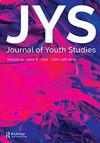芬兰年轻人的归属感和他者逻辑
IF 2.2
3区 社会学
Q1 SOCIAL SCIENCES, INTERDISCIPLINARY
引用次数: 0
摘要
摘要为了更好地理解21世纪西方社会中年轻人对“我们”和“他们”的认知方式,本文通过探索作为归属感锚点的价值观以及芬兰年轻人的他者逻辑,在自我-他者认同和疏远研究的更广泛背景下审视归属感和他者。对访谈数据(N = 45)的分析表明,在高中阶段学习的芬兰年轻人持有自我超越和对重要性变化开放的价值观,并将持有保护和自我提升相关价值观的人视为他们的他者。在他们的推理中,保护和自我提升的价值通常与(1)认识上的恶习有关,(2)社会不公正,(3)颓废的行为,(4)与现状的疏远。因此,这些他者的逻辑不是基于身份、(次)文化、宗教或种族,而是基于让人感到疏远和应受谴责的特征和意识形态,因为它们危及他人的价值观、权利和福祉。此外,这篇文章提出,虽然与前几代年轻人相比,当代年轻芬兰人的价值观没有太大变化,但他们描绘他人的标准已经发生了变化。关键词:其他价值的逻辑归属芬兰芬兰学生披露声明作者未报告潜在的利益冲突。注1:2022年冬季爆发的欧洲战争见证了人们的仁慈和团结的国际情感的增加,但也加剧了偏见和其他,特别是在芬兰(YLE News 2022)。也许在2022年,其他芬兰年轻人的逻辑可能会略有不同。本研究由芬兰科学院资助[资助号315860]。本文章由计算机程序翻译,如有差异,请以英文原文为准。
Anchors of belonging and the logics of othering of young Finns
ABSTRACTTo better understand the ways the youth perceive ‘us’ and ‘them’ in twenty-first-century Western societies, this article looks at belonging and othering in the wider context of research on self-other identification and distantiation by exploring values, as anchors of belonging, and the logics of othering of young Finns. The analysis of interview data (N = 45) shows that young Finns studying in upper secondary education hold values of self-transcendence and openness to change in importance and see people holding values related to conservation and self-enhancement as their other. In their reasoning, the values of conservation and self-enhancement are typically related to and become manifest as (1) epistemic vices, (2) social injustices, (3) decadent behaviors, and (4) alienation from the status quo. These logics of othering are thus not based on identity, (sub)culture, religion, or ethnicity, but on characteristics and ideologies that feel alienating and condemnable, because they jeopardize the values, rights, and wellbeing of others. Furthermore, this article brings forth that while the values of the contemporary young Finns have not changed much compared to the previous generations of youths, their criteria for depicting the other have shifted.KEYWORDS: Logics of otheringvaluesbelongingFinlandFinnish students Disclosure statementNo potential conflict of interest was reported by the author(s).Notes1 The war in Europe that erupted in winter of 2022 witnessed an international increase in feelings of benevolence and solidarity in people, but also enhanced prejudices and othering, especially in Finland (YLE News 2022). It may be that examined in 2022, the logics of othering of Finnish young people may have been slightly different.Additional informationFundingThis work was supported by the Academy of Finland [grant number 315860].
求助全文
通过发布文献求助,成功后即可免费获取论文全文。
去求助
来源期刊

Journal of Youth Studies
SOCIAL SCIENCES, INTERDISCIPLINARY-
CiteScore
5.00
自引率
10.50%
发文量
82
期刊介绍:
Journal of Youth Studies is an international scholarly journal devoted to a theoretical and empirical understanding of young people"s experiences and life contexts. Over the last decade, changing socio-economic circumstances have had important implications for young people: new opportunities have been created, but the risks of marginalisation and exclusion have also become significant. This is the background against which Journal of Youth Studies has been launched, with the aim of becoming the key multidisciplinary journal for academics with interests relating to youth and adolescence.
 求助内容:
求助内容: 应助结果提醒方式:
应助结果提醒方式:


